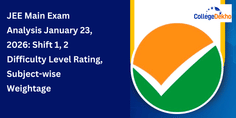The VTUEEE phase 2 slot 1 2025 syllabus comprises topics from physics, chemistry, and mathematics. To understand the entire syllabus and chapters read the article below.

VTUEEE Phase 2 Slot 1 2025 Syllabus: Applicants need to start preparing for the VTUEEE examination and they need to familiarize themselves with the syllabus to start effective preparation. The VTUEEE phase 2 slot 1 2025 syllabus carries topics like thermodynamics, current electricity, hydrocarbons, polymers, coordinate geometry, trigonometry, and others from physics, chemistry, and mathematics. This article briefs the applicants about the VTUEEE phase 2 slot 1 2025 syllabus.
VTUEEE 2025 Physics Syllabus
The applicants can start their preparation with the physics syllabus. They can allocate equal time to all the topics included in the syllabus.
Chapters | Topics in the Chapters |
|---|---|
Mechanics |
|
Properties of matter |
|
Heat and thermodynamics |
|
Optics |
|
Electricity |
|
Magnetism |
|
Atomic physics |
|
Nuclear Physics |
|
Electronic devices |
|
Laser and optic fiber |
|
VTUEEE 2025 Chemistry Syllabus
Refer to the table below to understand the VTUEEE 2025 chemistry syllabus.
Chapters | Topics in the Chapters |
|---|---|
Basic concepts of chemistry |
|
P, D, S and F block elements |
|
Solid state chemistry and coordination chemistry |
|
Chemical equilibrium, chemical kinetics, thermodynamics |
|
Redox reactions and electrochemistry |
|
Characterization and purification of organic compounds |
|
Basic principles of organic chemistry |
|
Hydrocarbons |
|
Organic compounds containing oxygen |
|
Biomolecules |
|
Polymers |
|
VTUEEE 2025 Mathematics Syllabus
The VTUEEE mathematics syllabus includes topics like matrices, trigonometric identities, vector algebra, and others. Refer to the table below for the syllabus for mathematics.
Chapters | Topics in the Chapters |
|---|---|
Partial functions |
|
Complex numbers |
|
Quadratic equations |
|
Matrices and determinants |
|
Trigonometry |
|
Permutations and combinations |
|
Binomial theorem for a positive index |
|
Two dimensional coordinate geometry |
|
Vector algebra |
|
Limit, differentiability and continuity |
|
Integration |
|
Ordinary differential equations |
|
Probability and set theory |
|
For more such exam updates stay tuned with CollegeDekho.
FAQs
The VTUEEE exam takes place in offline mode for the duration of 3 hours. 30 multiple choice questions are asked from each section of Physics, Chemistry and Mathematics. Candidates are awarded 1 mark for every correct answer and there is no provision of negative marking in the VTUEEE exam.
Yes. The VTUEEE syllabus is important as questions in the VTUEEE exam are asked from the syllabus of VTUEEE. Hence, candidates must have clarity about the VTUEEE syllabus before beginning their preparations.
Some of the important topics covered under the VTUEEE Chemistry syllabus are Hydrocarbons, Biomolecules, Polymers, Thermodynamics, Coordination Chemistry and Solid State Chemistry etc. Candidates must study for the VTUEEE exam keeping in mind the topic-wise weightage.
Some of the important topics covered under the VTUEEE Physics syllabus are Optics, Mechanics, Electricity, Properties of Matter, Magnetism etc. Candidates must study for the VTUEEE exam keeping in mind the topic-wise weightage.
Some of the important topics covered under the VTUEEE Mathematics syllabus are Vector Algebra, Integration, Matrices and Determinants, Trigonometry, Probability etc. Candidates must study for the VTUEEE exam keeping in mind the topic-wise weightage.
The syllabus of VTUEEE comprises the topics from the subjects of Physics, Chemistry, and Mathematics. The VTUEEE exam syllabus is decided by the admission authorities of Vel Tech Rangarajan Dr. Sagunthala R and D Institute of Science and Technology.

















Similar Articles
JEE Main Shift 2 Question Paper 2026 January 23
JEE Mains Question Paper 23 January 2026 Shift 1
JEE Mains Question Paper 22 January 2026 Shift 2
JEE Main Shift 1 Question Paper 2026 January 22
JEE Main Exam Analysis January 23, 2026 (Out): Shift 1, 2 Difficulty Level Rating, Subject-wise Weightage
JEE Main 2026 January 24 Exam Analysis: Shift 1 and 2 Subject-Wise Difficulty Level, Good Attempts